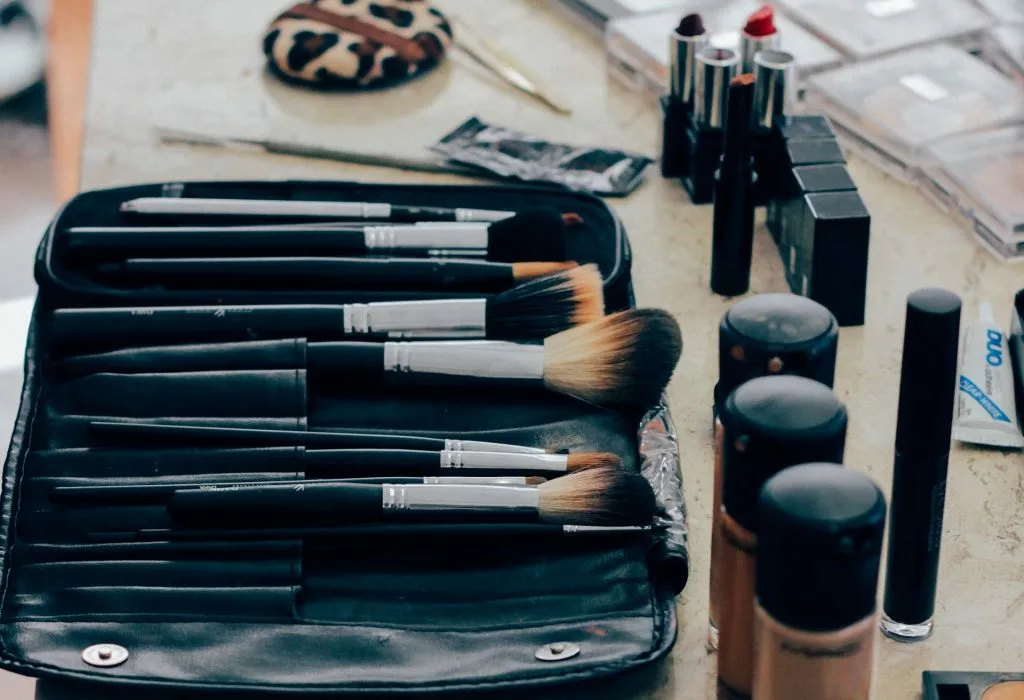When you think about what’s in your makeup bag, you probably think foundation, mascara, eyeliner, etc. But let’s delve a little deeper. What ingredients are in your makeup bag? The answer may surprise you.

Since 2009, 595 cosmetics manufacturers have disclosed that they’ve used 88 chemicals that are connected to cancer, birth defects, and/or reproductive harm in over 73,000 products. How is this possible? The answer lies in the fact that the beauty industry is virtually unregulated, so manufacturers are free to use chemicals in their products without any meaningful government oversight.
Though most chemicals are not causes for concern, some chemicals in cosmetics have been linked to serious health problems. For example, diethylhexyl phthalate harms the reproductive system, can affect a developing fetus, and is a potential endocrine disruptor. The International Agency for Research on Cancer has also classified it as a possible carcinogenic. Where can you find it? Eyelash glue. Dibutyl phthalate, a similar chemical with similar health effects, can be found in perfumes and nail polishes.
The beauty industry, however, does not seem to care about the potential health consequences of these dangerous ingredients. Manufacturers also use cancer-causing chemical formaldehyde in some keratin hair straighteners, eye shadows, mascaras, or blushes to prevent bacteria. 1,4 dioxane, another chemical linked to cancer, creates suds in products like soap and shampoo. Lead and other heavy metals can be found in lipstick and eyeliner, and the carcinogen silica shows up in lip gloss, eye shadow and foundation. And the list goes on. A more complete list of toxic chemicals in cosmetics can be found on the Chemicals of Concern page at the Campaign for Safe Cosmetics.
Even as recently as June 2019, the Food and Drug Administration announced voluntary recalls of cosmetic products made with talc because they contained asbestos. Small amounts of asbestos can cause mesothelioma and other diseases years after exposure. Talc-based products are especially at risk for asbestos contamination because talc and asbestos come from the same parent rock. The Environmental Working Group compiled a cosmetics database and found that talc was an ingredient in more than 2,100 cosmetic products, and approximately 1,200 of those talc-containing products were loose or pressed powders, which pose an inhalation risk. All of those products are at risk for asbestos contamination.
Yet, consumers continue to use a variety of cosmetics. Every day, American women use an average of 12 personal care products that contain 168 different chemicals, and men use an average of six products that contain 85 different chemicals. Some of these chemicals don’t even have to be disclosed on the package, but can simply be listed as “fragrance”, according to federal labeling standards. So, consumers remain unaware of the dangers. To make matters worse, most products are slathered directly on the skin where ingredients can be absorbed directly into the bloodstream.
Before you vow never to buy cosmetics again, you should know that the consumer trend of looking for natural products is starting to transform the cosmetic industry. Some states have proposed legislation that would crackdown on dangerous chemicals in cosmetics. And some companies are voluntarily changing. For example, clean beauty lines are gaining traction, and some existing companies are banning dangerous chemicals from products sold in their stores and offering more natural beauty products.
However, be wary of brands with images that convey a “natural” product. No governing bodies regulate terminology such as “clean” and “natural,” so any company can technically call a product “clean,” even if it contains dangerous chemicals. Companies may take advantage of this lack of oversight to manipulate consumers. For a list of truly toxic-free cosmetics, check out the Environmental Working Group’s Skin Deep Cosmetics Database.
Overall, cosmetics users should be vigilant about which products they’re buying in order to limit their exposure to chemicals that may pose a risk of serious health problems. If you or your family have been impacted by health problems following the use of cosmetics, you may be entitled to compensation. Please call our cosmetics injury attorneys for a free and confidential case evaluation at 630-527-1595. Our legal team can help you win your case.
Blog written by Dayna Smith and Meg Collins.
Sources:
https://www.ewg.org/californiacosmetics/toxic20
http://www.safecosmetics.org/get-the-facts/chemicals-of-concern/red-list/

"*" indicates required fields